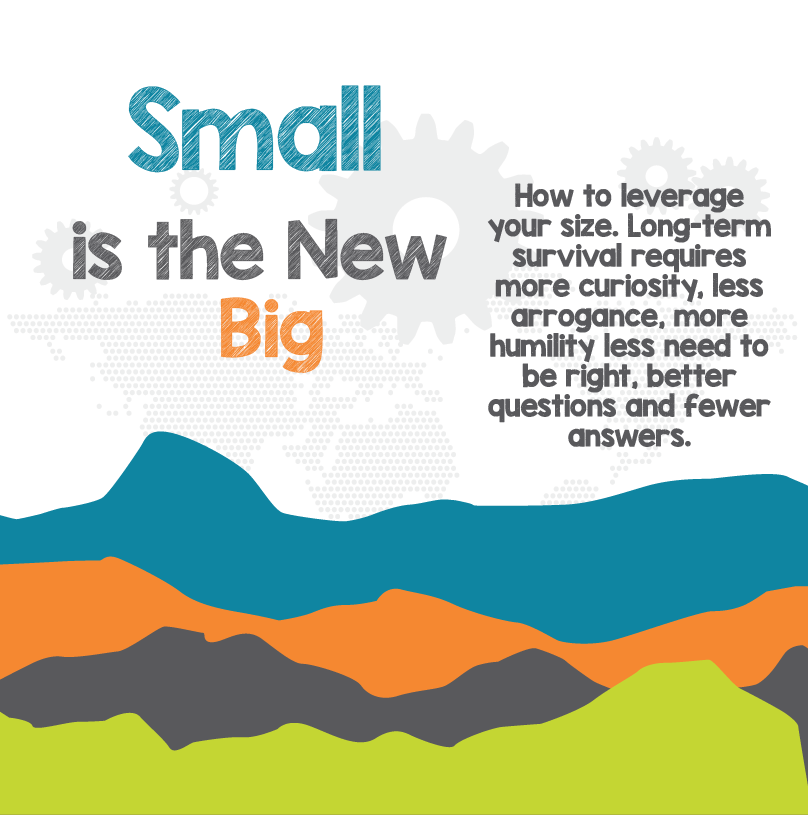David v Goliath – The advantage of being small
The big guys have all the advantages, right? They have money, power, prestige, status and often history and longevity. All of which makes it easier for them to hire the brightest and the best, in some cases providing golden hello’s, stock, equity, options, flashy gym memberships, private healthcare and a bundle of other impressive perks. They have the fancy offices, cool breakout rooms, they have marketing muscle, the burgeoning brand and the big name.
But, hey hold on a minute! They also often have gargantuan infrastructure, crippling overheads, layers of hierarchy and a culture focused pleasing the boss rather than the customer. (The boss being the one that’s gonna sign off your next promotion). So, getting good stuff done and making a conspicuous impact is like wading through treacle! All of which means change is at its worst challenging and painful, at best shunned and slow. In short, and to mix metaphors, elephants don’t gallop and you can’t turn a super tanker on a sixpence.
It’s precisely the inertia and inflexibility of large competitors that opens up the opportunities for the little guys (and gals).
In most instances it’s the smaller players in any market that are the people shaking things up; it’s easy for them to take and present innovative ideas that change, shape and shift evolving customer preferences. The ability to work fast and loose can easily mess up the big fellas usually pathetic customer service and delivery, and to capitalise on emerging trends the big guys either, don’t see, don’t care about, or can’t respond fast enough to. Small and nimble is a major competitive advantage.
The advantage of being the little guy
Charles Darwin, who incidentally used to live just down the road to our office in Bromley, is famous for his publication “On the Origin of a Species” where he coined the term “survival of the fittest”. I like to think the term “fittest” was very deliberate. He didn’t say biggest, richest, fastest, toughest, cleverest. In our context “fittest” means the most adaptable. Small companies are much more adaptable than the big ones.
The key to adaptability and long-term survival is how flexible you are in response to external influences and changes in the world external to your company.
There is a fella called Arie de Geus, he was key to the strategic and scenario planning undertaken at Shell for about 40 years. He’s also the guy credited with developing the revolutionary concept of “The Learning Organisation” and as a result of his interest in organisational longevity he published a book called “The Living Company” in which he identified the critical characteristics of organisational adaptability and longevity.
He suggests that agile and long-lived companies have four essential traits in common; they are:
- Sensitive to their environment allowing them to learn and adapt quickly
- Cohesive, so they have a strong sense of identity;
- Tolerant of unconventional thinking and experimentation, so they try new stuff; and
- Conservative financial planners, so they retain sufficient cash that allows for flexibility (and for protection when things go wrong).
All of these points, with the possible exception of the last one, are considerably easier for a small company to adopt to than a big one.
De Geus’s view is largely shared another fella, one of my favourite management thinkers, Keith Cunningham, where in his book “The Road Less Stupid” he suggests “survival requires more curiosity and less arrogance; more humility and less need to be right; better questions and fewer answers.”
However, I think there’s another issue that both guys have missed. In a big company, there is little direct ownership of any outcome, whereas in a good small team everybody can be wedded to the organisations purpose and doing good stuff for customers. In a big company people are just nameless cogs in a humongous faceless machine. In a small company people are trusted friends, colleagues; they know you, you know them and you know they’ve got your back.
Small succeeds because it has nothing to lose, it can move fast and embrace mistakes, especially when they are committed to learning. Big succeeds through power, dominance and strength.
Another critical differentiation De Geus made was the difference between was between his so-called “living companies” and “economic companies”. With a living company the purpose is to fulfil their potential and perpetuate themselves as ongoing communities. “Economic companies” on the other hand are in business solely to produce wealth for a small group of individuals. His argument was that living companies manage for survival; economic companies manage for profit.
Which would you rather be?
Conclusion
Long-term survival for the little guy requires more curiosity, less arrogance, more humility less need to be right, better questions and fewer answers. Size (and tradition) is often the enemy of flexibility and a significant barrier to the need to adapt and change. Just think of the UK’s car and motorbike industries which once dominated the world. They were overtaken by smaller foreign upstarts. Just think of the global car manufacturers being taken out by Tesla, now often quoted as being worth as much as Ford and General Motors put together. Just think of the blockbuster Goliath being taken out by the Netflix David. Prior success is meaningless if the external world changes.
The little guys are much more adept at managing change and there’s a hell of a lot more change to come.
Related tools and ideas
Tools for looking at the outside world in order to spot change include:
Recommended references
- The Living Company – Arie de Geus
- On the Origin of Species – Charles Darwin
Downloadable resources
- There is a plethora of resource is on the pestle Porter and SWOT analysis links above



Comments are closed